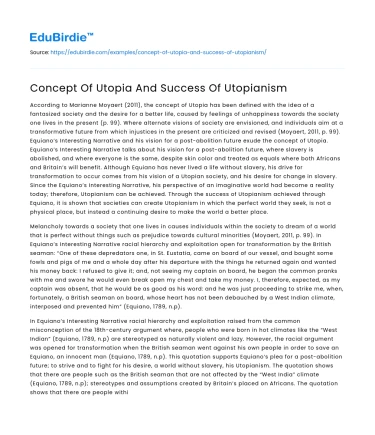According to Marianne Moyaert (2011), the concept of Utopia has been defined with the idea of a fantasized society and the desire for a better life, caused by feelings of unhappiness towards the society one lives in the present (p. 99). Where alternate visions of society are envisioned, and individuals aim at a transformative future from which injustices in the present are criticized and revised (Moyaert, 2011, p. 99). Equiano’s Interesting Narrative and his vision for a post-abolition future exude the concept of Utopia. Equiano’s Interesting Narrative talks about his vision for a post-abolition future, where slavery is abolished, and where everyone is the same, despite skin color and treated as equals where both Africans and Britain’s will benefit. Although Equiano has never lived a life without slavery, his drive for transformation to occur comes from his vision of a Utopian society, and his desire for change in slavery. Since the Equiano’s Interesting Narrative, his perspective of an imaginative world had become a reality today; therefore, Utopianism can be achieved. Through the success of Utopianism achieved through Equiano, it is shown that societies can create Utopianism in which the perfect world they seek, is not a physical place, but instead a continuing desire to make the world a better place.
Melancholy towards a society that one lives in causes individuals within the society to dream of a world that is perfect without things such as prejudice towards cultural minorities (Moyaert, 2011, p. 99). In Equiano’s Interesting Narrative racial hierarchy and exploitation open for transformation by the British seaman: “One of these depredators one, in St. Eustatia, came on board of our vessel, and bought some fowls and pigs of me and a whole day after his departure with the things he returned again and wanted his money back: I refused to give it; and, not seeing my captain on board, he began the common pranks with me and swore he would even break open my chest and take my money. I, therefore, expected, as my captain was absent, that he would be as good as his word: and he was just proceeding to strike me, when, fortunately, a British seaman on board, whose heart has not been debauched by a West Indian climate, interposed and prevented him” (Equiano, 1789, n.p).
Save your time!
We can take care of your essay
- Proper editing and formatting
- Free revision, title page, and bibliography
- Flexible prices and money-back guarantee
In Equiano’s Interesting Narrative racial hierarchy and exploitation raised from the common misconception of the 18th-century argument where, people who were born in hot climates like the “West Indian” (Equiano, 1789, n.p) are stereotyped as naturally violent and lazy. However, the racial argument was opened for transformation when the British seaman went against his own people in order to save an Equiano, an innocent man (Equiano, 1789, n.p). This quotation supports Equiano’s plea for a post-abolition future; to strive and to fight for his desire, a world without slavery, his Utopianism. The quotation shows that there are people such as the British seaman that are not affected by the “West India” climate (Equiano, 1789, n.p); stereotypes and assumptions created by Britain’s placed on Africans. The quotation shows that there are people within the British community as well as outside of it that have hearts not only for African by for humanity. That all people are equal and should not be exploited simply because of the racial hierarchy that had been placed upon them.
In order for Utopian society to be achieved, individuals within the society need to take action as well as engage themselves in acts, that will make their dream of the metaphoric place a reality. Images of desired places, utopias, are all around us and it affects an individual’s engagement within their society. In relation to Equiano, his vision for a better life for Africans did not stop within his dreams, he took action and wrote about his story to create change. “The innovation and transformation of the social imagination find its final destination in meaningful action” (Moyaert, 2011, p. 101), in order for the desired society to come to life, motivation by individuals within the society need to be enough to create action. With action, the favorable outcome will be achieved. Political actions are forms of public engagement aimed at reshaping the public discourse and life (Moyaert, 2011, p. 101). When imaging a utopian place, individuals often contrast it to the current society they live in – and it generates a facilitative outcome of utopian thinking on societal engagement thus triggering action by the individual(s) to create action.
Actions are taken place to make individuals dream of a Utopian society, reality (Moyaert, 2011, p. 101) not only shaped by the minorities but by everyone breaking the social norms and opening the window for transformation to occur. According to Marianne Moyaert (2011), the concept of Utopia has been defined with the idea of a fantasized society and the desire for a better life, caused by feelings of unhappiness towards the society one lives in the present (p. 99). Where alternate visions of society are envisioned, and individuals aim at a transformative future from which injustices in the present are criticized and revised (Moyaert, 2011, p. 99). From which injustices in the present are criticized and revised, continuing the desire to make the world a better place.






 Stuck on your essay?
Stuck on your essay?

